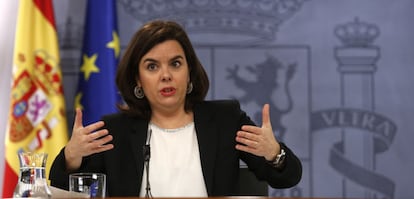Government agrees to seek consensus before signing EU refugee deal
Acting Prime Minister Rajoy had refused to appear in Congress over controversial plan


In the face of opposition from all other parties, acting Prime Minister Mariano Rajoy has backed down on his intention to sign up to a European Union deal with Turkey to expel refugees. As was explained on Friday afternoon by acting Deputy Prime Minister Soraya Sáenz de Santamaría, after the weekly Cabinet meeting, the Popular Party (PP) will instead seek “political consensus” on the issue before taking a position.
News had broken earlier that Rajoy was to go to the European Council on March 17 to defend a position that most of Spanish Congress radically rejects. Apart from his own party, all other congressional groups – 227 deputies out of a total of 350 – feel that the deal is illegal.
Apart from the Popular Party, all other congressional groups – 227 deputies out of a total of 350 – feel that the deal is illegal
After apparently signing up to the deal on Monday, Rajoy refused to appear before his own Congress to explain it and negotiate a common Spanish position on the subject of refugees.
But by Friday afternoon the PP had changed its tune. Rajoy and the government would, Sáenz de Santamaría explained, negotiate an agreement with other parties – despite the outright rejection of the plan expressed by the leader of the main opposition Socialist Party (PSOE), Pedro Sánchez.
EU commitments to Turkey
The European summit on March 7 yielded the following commitments:
- To return to Turkey all new illegal immigrants (including refugees) who travel from there to Greece. The EU will cover the expenses.
- For every Syrian citizen who is readmitted to Turkey, the EU will resettle another Syrian from the refugee camps located on Turkish territory.
- To allow Turkish citizens to enter the EU without visas as early as June 2016.
- To speed up the release of €3 billion that the EU promised Turkey to deal with the Syrian refugees, and to decide on Turkey’s demand for a further €3 billion.
- To speed up negotiations for Turkish EU membership.
Sáenz de Santamaría was also at pains to explain the complicated situation in which the acting government finds itself over this deal, which was negotiated at a meeting of heads of state and prime ministers on March 7 in Brussels, and accepted unanimously by the 28 EU member states.
The meeting, the acting deputy PM explained, was informal; nothing was signed there; and the EU institutions and member states will still have time to work and define the announced deals.
The controversy comes from the plan to return all refugees or asylum seekers who enter Europe illegally to their countries or to Turkey.
Sáenz de Santamaría added that the administration knows that it is an acting government, and that it needs the “consensus of Congress” in order to take an official position on such a controversial issue.
The deputy PM announced the intention of the Rajoy administration to “find and work toward” the path to achieve consensus over the coming days
The deputy PM announced the intention of the Rajoy administration to “find and work toward” the path to achieve that consensus over the coming days, although she later called for more time to debate the issue with other countries.
The European Council meeting that will deal with this informal pact has been set for this coming Thursday.
Before the climbdown, Rajoy had been planning to send a state secretary to the meeting, after claiming that an acting government is not subject to parliamentary control. Following an inconclusive election on December 20, Spain has yet to name a new prime minister, and could face a fresh vote in June if no progress between the parties is made in the coming weeks.
English version by Simon Hunter and Susana Urra.
Tu suscripción se está usando en otro dispositivo
¿Quieres añadir otro usuario a tu suscripción?
Si continúas leyendo en este dispositivo, no se podrá leer en el otro.
FlechaTu suscripción se está usando en otro dispositivo y solo puedes acceder a EL PAÍS desde un dispositivo a la vez.
Si quieres compartir tu cuenta, cambia tu suscripción a la modalidad Premium, así podrás añadir otro usuario. Cada uno accederá con su propia cuenta de email, lo que os permitirá personalizar vuestra experiencia en EL PAÍS.
¿Tienes una suscripción de empresa? Accede aquí para contratar más cuentas.
En el caso de no saber quién está usando tu cuenta, te recomendamos cambiar tu contraseña aquí.
Si decides continuar compartiendo tu cuenta, este mensaje se mostrará en tu dispositivo y en el de la otra persona que está usando tu cuenta de forma indefinida, afectando a tu experiencia de lectura. Puedes consultar aquí los términos y condiciones de la suscripción digital.








































